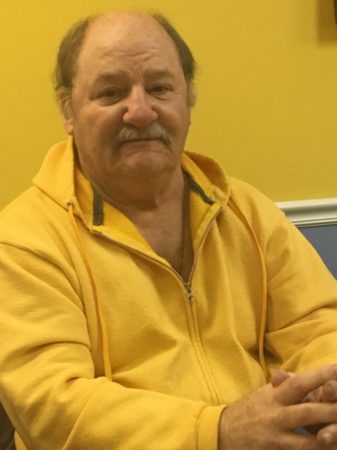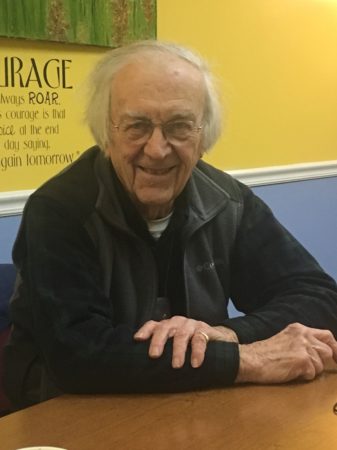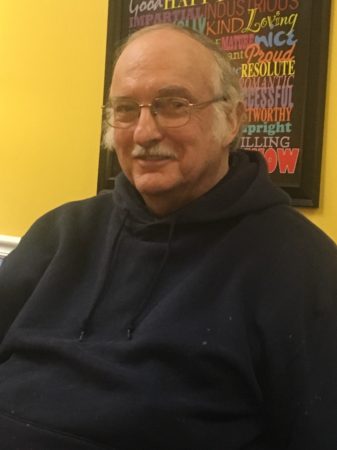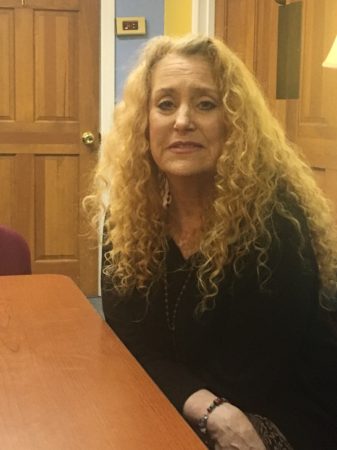Jack Sullivan knew what it meant to be depressed. He had experienced seasonal affective disorder (SAD) before but always felt better fairly quickly. About two years ago, things were different.
It just started snowballing and it got way out of control. I was having unbelievable anxiety, then severe depression. I was hospitalized for a little bit and got on a medication that finally worked. I’ve been doing much better.
Jack Sullivan
It’s not just the medication that’s been helping Jack. It’s also the support he’s been getting from a group called H.O.P.E. It stands for Healing of Persons Exceptional.
The group was started in 1987 by Dr. Ken Hamilton, a surgeon from South Paris, Maine. His initial purpose was to help five of his patients who had cancer “get ahold of their lives and face their life-threatening illness.”
It was modeled after instruction I got in medical school in 1962 that I am to promise my patients I will do my best to help them get on with their lives. It wasn’t until we’d been going for a few months that family members wondered if they could be a part of it and then somebody with depression wondered and then somebody else with some other disease wondered.
Dr. Ken Hamilton
The primary mission of H.O.P.E. was and still is to:
- Help people find meaning, value, and purpose in life
- Create a safe place to practice attitudinal healing and letting go of fear and conflict by seeing life in a peaceful and loving way.
The core of what Ken has tried to accomplish with H.O.P.E is based on the teachings of Earl Nightingale, who coined the phrase “the essence of success.”
Success to Nightingale was the progressive realization of a worthy ideal. All of us are born with one. Life may make it difficult to serve that ideal, but the greatest service you can do for yourself and others is to bring the ideal back and serve it.
Ken
Jack learned about H.O.P.E from his friend Bob Gaudreau, who has belonged to a group in Portland, Maine for several years. It spoke to him.
I started going along because I was looking for some kind of peace, serenity or whatever. As I started to get better on medication, I continued going to the group because I like going. I like the people who attend and it’s a place for me to go. I think of it as a place of refuge. I know I can be safe, I can discuss anything that’s going on with me and vice versa. There’s a lot of support.
Jack
For Bob, belonging to H.O.P.E. led to an attitude shift about his own issues.
I find the group to be metaphysical. It answers three questions: Where did we come from? Who are we? Where are we going? And I came up with a fourth question. What are we going to do when we find the answers? H.O.P.E provided answers and helped heal my attitude. I have a mental health challenge called bipolar disorder, but I’m more than a disease, I’m a human being.
Bob Gaudreau
The H.O.P.E. group that Jack and Bob attend is led by Liz Holder, who has her own story to share.
I got sober in 1986. About three or four years later I started seeking spirituality and discovered attitudinal healing in the form of A Course in Miracles — Jerry Jampolsky and Marianne Williamson. That became my passion and I ran a few groups in New York and in Florida. I moved to Maine about 12 1/2 years ago and started counseling at Serenity House. I knew I wanted to start a spirituality group, but I couldn’t call it a Course in Miracles. I needed a format.
Liz Holder
She prayed on it and about 10 days later, Ken showed up at Serenity House wanting to talk to someone about his H.O.P.E. groups.
I said where have you been all my life? He said waiting. And so, that’s how it happened. It is my passion to do these groups and to help people. I’ve seen the miracles of H.O.P.E. helping people find themselves under all those layers of conditioning and fear. It’s open to anyone.
Liz
Liz guides two groups — both free-flowing in that they talk about anything and everything. She’s careful, though, to keep the focus on attitudinal healing.
Attitudinal healing is basically changing the way you think. By changing the way you think, you can change your entire life. It is healing. I have lupus and I am a recovering alcoholic and drug addict. My parents died in a car accident, so I’ve suffered severe grief in my life. You can’t change the past but you can change the way you look at it and you can change what you do with it. You don’t have to let it define you.
Liz
No what knows the difference a H.O.P.E. group can make in someone’s life better than Ken. He’s helped guide more than 5000 meetings —at one time, he was doing eight a week. He’s written three books: SoulCircling: The Journey to the Who, The H.O.P.E. Story with Joyce Murphy, RN, and The H.O.P.E. Manual. He wants to continue guiding groups and to train others to guide their own H.O.P.E. groups. Liz can also train anyone who’s interested.
What I have learned over the last 47 years is to be shared unconditionally with anybody who can use it for the benefit of themselves or another human being. So get in touch with me.
Ken
You’ll find lots of information on the H.O.P.E website and here are details about the groups that Ken and Liz now lead:
- First Congregational Church, Haskell House, 17 E Main St, South Paris, Maine. Mondays 4:00-6:00; Contact Ken Hamilton (207) 890-3673 (cell).
- Maine Medical Center, Dana Health Education Center, 22 Bramhall Street, Room 1, Portland, Maine. Wednesdays 5:00-7:00 PM, Contact Liz Holder (727) 420-2964 (cell).
- Portland Recovery Community Center, 468 Forest Avenue, Portland, Maine. Thursdays 5:30-7:30, Contact Liz Holder (727) 420-2964 (cell).





Great article… much appreciated… deep gratitude.
You’re the primary reason it was, Ken. Thanks for all you do. Truly a person exceptional.